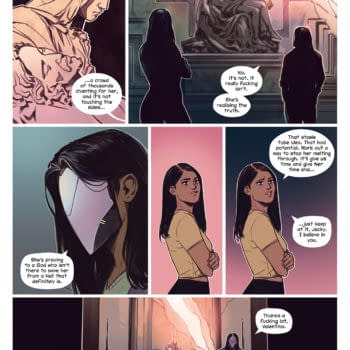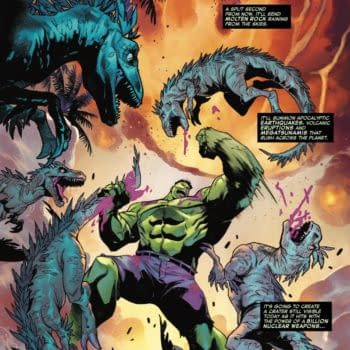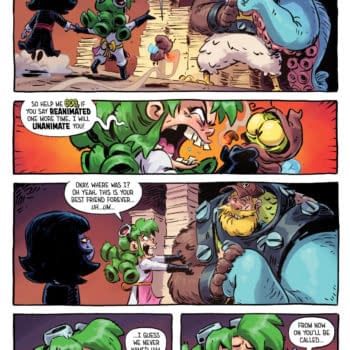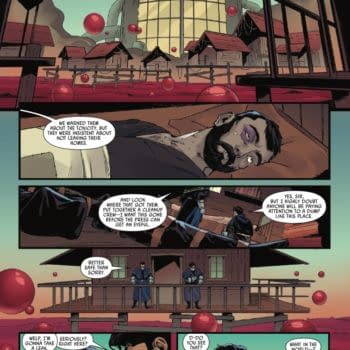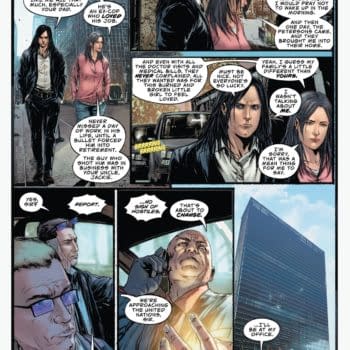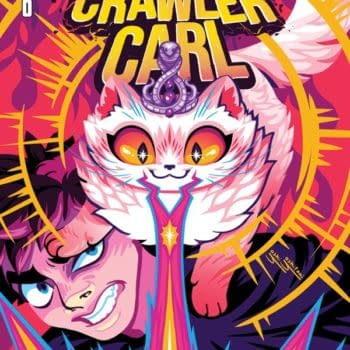Posted in: Comics | Tagged: animal, Comics, entertainment, matt hawkins, Rahsan Ekedal, think tank, top cow
"This Is Happening Now And It Scares The Crap Out Of Me" – Matt Hawkins On The Science Of Think Tank: Animal
One of the first interviews I did in person for Bleeding Cool was a sit down with Think Tank creators Matt Hawkins and Rahsan Ekedal. This was before I had ever written a page for them. I could tell by the way the talked about the series that it was more than just a job. They loved working on this book and continue to work on it leading into the new fifth volume of the series: Animal. I talked with Hawkins recently about the new volume. How personal was this series for him, how realistic was the science and could animals really be used as assassins? His answers have me eyeing the my pitbull and the bird on my fence a little closer.

MH: Well he's had some time in a mental facility to recuperate. He's on medication now (not coincidentally the same medication I used to take). I wanted to show that depression is a real thing that's not shameful and people need help, not condemnation or useless platitudes about how shit is going to get better. He's been through the ringer, has faced his darkest moment where he truly believed he wanted to die…and now he's out on the other side of that. Happy to be alive, realizing the scary spiral of depression thought. He's bored sitting around doing nothing, he doesn't necessarily want to go back to work, but he wants to do something.
DW: What is it that brings Loren back to work? And what types of things will he be dealing with both from a job / crisis standpoint and on a personal level?
MH: This is dealt with quickly in the first issue. One of his technological designs has been altered and is now being used to control animals and use them as suicide bombers. His former mentor has been kidnapped and the threads all coalesce in a certain direction that he helps the CIA and foreign agents work to uncover the truth.
DW: Would you consider this a good jumping on point for new readers? What do people need to know to get into the series? If you were going to pick a place in the run to start, would it be issue one of volume one or is there another good place as well?

DW: What has the journey for Loren been over the last, what is 5 years that you've been writing him? How does he differ going into the fifth volume from where he was in his first appearance?
MH: He's less naive, but more set in his ways than ever. He's grown emotionally and is able to have real relationships with people, but this has made him more fragile and his inexperience with handling emotional trauma nearly cost him his life at his own hands in V4.
DW: When I read Think Tank, I find that Loren has similarities to you in some ways. How much of yourself do you put into him? How does writing this book differ from the other series you are writing?
MH: I write this character with my own voice. It's the only one of the thirty or so characters I write that I do that way. I have a very personal attachment to this character and we share many of the same views on life, politics, religion and love. I'm not as smart as the character portrayed and he's not as emotionally mature as I like to believe I am (ask the wife, lol). Ultimately it's a good fusion of me, Rahsan and scientists I've known personally in the past.
DW: I know you're big on research. Volume 4 of Think Tank focused on the U.S. infrastructure and it's glaring weaknesses. I believe most if not all of what you did was based on recent findings. Volume 5 goes into animals being used as assassins through a surface thought reader Loren invented. Is this something now in the realm of possibility and should I be keeping a closer eye on my dog?

DW: You have been doing some really good science fiction work over the last couple years both as a writer and as a publisher. But since so much of what Think Tank is about is based on the actual cutting edge technology that is being worked on right now, do you consider the book science fiction? How would you classify the series?
MH: It's science-fiction but I call it a hard science thriller. This one especially I try really hard to make all the science accurate. It's borderline obsessive so when a real scientist reaches out to me and tells me something is wrong I will fix it in the next printing. There are six different versions of Think Tank V1 #1 out there. The last 4 versions are maybe two words different. No one would know if I didn't point it out.
DW: You've said that you've been selling more of your different trades than the individual issues that make them up combined. Putting your publisher cap on, why is it important for fans to support the individual issues of series they like and not just wait for the collections?
MH: It's all about cash flow and the time value of money. Indie publishers NEED the cash flow of the 32 page books to recoup some of the costs of creative in advance of the publication of the trade. I wrote a Facebook post a couple years ago using easy math to show why this is true.
DW: There have been some rumors of a Think Tank television series. I'd be remiss in my job if I didn't ask you what the status is on that. Are we going to see Think Tank on the small screen in the near future?
MH: Think Tank had been optioned for the last 30 months to be developed as a TV series. I had high hopes but it did not materialize. Working with my agents now to figure out what to do with it, but we're likely to try and set it up as TV again. Marc Silvestri and I have a very simple philosophy, we'd rather have nothing than have something come out that's bad. It's served us well so far. I love Think Tank. It has to be done right.









